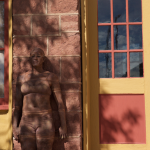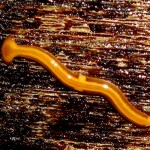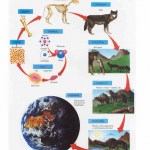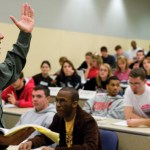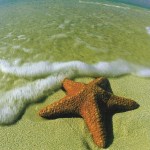learning
Dopamine is an important hormone released from neurons involved in reward pathways. Researchers at Cornell University wanted to know if dopamine signaling was involved in how birds learn songs. Their findings, recently published in Science, present evidence that neurons in the brain of zebra finches do in fact decrease dopamine signals when the birds hear an error in their song in comparison to when they sing 'correctly'. The researchers also found that dopamine signaling was enhanced when the birds corrected a mistake made during a prior attempt.
Sources:
V. Gadagkar…
The latest National Geographic Roundtable Question: Survivor-style television has grown increasingly popular over the years and done a great job of illustrating our brain's fascinating built-in survival instinct. What role do you think our ancestral instincts play today in helping us survive, thrive and accomplish our goals? How much of our ancestral survival instincts are innate verses learned?
First, the innate vs. learned part of the question. This is a false dichotomy. We have evolved to learn. We probably have "built in" mechanisms to learn new things. This means that when we have…
“Who is more humble? The scientist who looks at the universe with an open mind and accepts whatever the universe has to teach us, or somebody who says everything in this book must be considered the literal truth and never mind the fallibility of all the human beings involved?” -Carl Sagan
It's a challenging thing, to admit to ourselves how vast and mysterious this Universe is, and how small and ignorant we all truly are. It can feel daunting and isolating to think about it, and solace can be difficult to find, as Mazzy Star can maybe help you related to as you listen to their wonderful song…
Figure from Journal of Experimental Biology.
Researchers Tal Shomrat and Michael Levin at Tufts University have found that planaria worms are able to quickly relearn lost skills after literally losing their heads. The researchers trained the worms to find food in an environment with bright light and open space, both considered uncomfortable to the creatures. The time it took for worms to adjust to the environment and find food was recorded. Then, the researchers severed their heads and waited for the head and brain to regenerate (see image above). What…
"I am always ready to learn, although I do not always like to be taught." -Winston Churchill
My very first time leading a classroom -- on my own -- was back in June of 2000. I was 21 years old, fresh out of college, and was teaching science in a middle school classroom. And I asked what I thought was an innocuous question, designed to pique their curiosity. I asked the class, "What are we -- you, me, and all human beings -- made of?"
I was expecting many possible answers common to all living things, ranging from "blood and guts" to cells, molecules, or atoms. From a scientific…
“If you end up with a boring miserable life because you listened to your mom, your dad, your teacher, your priest, or some guy on television telling you how to do your shit, then you deserve it.” -Frank Zappa
Inside of every student I've ever taught lives a passionate, curious mind that can either flourish or stagnate, both inside and outside the classroom. The teachers that get it -- that get you -- are the ones that help bring you there, but that is not all teachers, not by any means. I think everyone, by this point in their life, has had experience with at least one teacher that…
"You don't use science to show that you're right, you use science to become right." -Randall of xkcd
In January of 2008, I began writing this blog, Starts With A Bang, both for myself and for all of you, because we all have something in common.
Image credit: © Stéphane Guisard, "Los Cielos de Chile", via astrosurf.com.
The same planet, the same heavens, the same laws of nature and the same Universe are something that we all have in common. And all of us, no matter how intrinsically smart, talented, or brilliant our instincts are, come into this world knowing absolutely…
I am just now recovering from last week's Art of Science Learning conference in San Diego. For something that lasted just one-and-a-half days, there was an almost overwhelming amount of great presentations, great information sharing and exchange, and -- above all -- great people dedicated to moving the idea of the Art of Science Learning forward.
When I first made plans to attend, I did so as an observer. However, soon after the presentations began on the first morning of the conference, I became an active and engaged participant. Each presentation provided me with a deeper understanding of…
The first thing that I saw was this article from nola.com (The Times-Picayune) "New teacher evaluation method being proposed in Jefferson Parish". Let me summarize this article.
Basically, one of the local School Board wants to use a learning tool (Interval Testing) as a teacher evaluation tool. The Interval Testing program gives students spaced out evaluations through out the year to help them (and teachers) assess the preparedness of the students. These are non graded assessments and have been shown to help students. Note - the purpose of the implementation of Interval Testing is to…
This is something I use at the beginning of a semester. I ask the class: "How are you an expert?" What is an expert? Let me call an expert someone that is comfortable answering questions about that particular topic.
If students are too shy to share (especially on the first day of class), I will start it off. I am an expert in:
Some (but clearly not all) physics stuff. In particular, classical mechanics, physics education, numerical modeling (though not really an expert - but I could answer questions).
I can play the clarinet and saxophone - but I haven't practiced in a long while
I…
It would be nice if I could come up with a good rhyme for grade to fit this title.
One of my brothers is a biochemistry faculty at Appalachian State University (hint - he is the one with the same last name that I have). We were talking (and surprisingly agreeing) that grades were dumb. What would happen if we stopped grading? Wouldn't that be awesome?
So, what would happen if there were no grades? Here are some thoughts.
We would only have one job in the class - help students learn. The second job of evaluating student understanding would only be there to help them learn more.
It would…
I am not normally a book-review-kind-of-guy. However, in this post I will make an exception. My wife (who clearly knows me very well) bought me this book - Made by Hand: Searching for Meaning in a Throwaway World (amazon link)
The basic idea of the book is to look at how the author (Mark Frauenfelder) started doing more and more Do-it-yourself type stuff (DIY). He goes through his efforts to grow his own stuff, raise chickens, build guitars and stuff like that. Very enjoyable read. It wasn't so much about how to do stuff as much as it was about making stuff rather than buying stuff. (do…
First, where does Chad come up with these links? Oh, I am talking about Chad from Uncertain Principles. In his latest links of the day, I found this:
Skip Class Calculator
What a great idea. Basically, you enter some info about the class - like how often it meets, how many classes you have skipped, when is the next test and stuff. The calculator then tells you if you should go to class or not. Brilliant. Actually, this seems like the academic version of Run Pee. Yes, I said run pee. Run Pee is an app for your iphone that tells you at what point during a movie you can go to the…
I see that Doug at Nanoscale Views has fond memories of the hit show The Mechanical Universe. If you have never seen this show, it is quite excellent (even if old).
Perhaps the best thing about The Mechanical Universe is that it might be the best that traditional lecturing can provide. Oh, I know it isn't quite the same. Students can't ask questions while watching a video. But the main point is that if you want to go with some type of traditional lecture style format for a class, you would be hard pressed to do better than this. Or maybe something similar - there are other good video…
We (Southeastern Louisiana University College of Science and Technology - but it should be called Science, Technology and Math) just had our fall convocation. Normally, we would share departmental news (which we did) and introduce new faculty. There are no new faculty and haven't been any new hires for quite some time now. Anyway, there are some things to report.
First, no one (not even the Dean) knows what is going to happen. No news is good gnus?
The LA Grad Act: This is a Louisiana state thingy that basically says we need to increase graduation rates. Here is the official site for…
You thought I was going to talk about a problem that math teachers could use, didn't you? Well, maybe math teachers can use this. (note: when I say "teachers" I really mean "learning facilitators")
It all started when I read this valedictorian speech from Erica Goldson. Here is part of it:
"I am now accomplishing that goal. I am graduating. I should look at this as a positive experience, especially being at the top of my class. However, in retrospect, I cannot say that I am any more intelligent than my peers. I can attest that I am only the best at doing what I am told and working the…
I don't hate math, that is just the title of the post - notice that I put it in quotes.
As you may know, I teach this physics course for elementary education majors (using Physics and Everyday Thinking - which is awesome). The curriculum has very little math in it. That is not necessarily a good thing, but it helps the students understand science and the nature of science without bringing in this mental block they have for math. One of the activities has them look at the energy efficiency of different devices. At the end of the activity, they are asked:
A fluorescent bulb is 25% efficient…
I have been thinking about grades lately and I am pretty sure they are dumb. The main problem is that it seems that many many many people (politicians, parents, students, administrators, some other faculty, and zombies) think that the grade is the THE THING to worry about. Really, it is just a pale representation of the real thing.
This brings me to the allegory of the cave. I know you remember this when you read Plato's The Republic, right? Here is a picture that explains the whole thing:
I don't know where this image came from, it was on a boat load of other websites, none looked like…
tags: psychology, behavior, pedagogy, education, learning, teaching methods, model/rival technique, Avian Learning EXperiment, Avian Language EXperiment, ALEX, researchblogging.org,peer-reviewed research, journal club
ALEX the African Grey Parrot and Dr Irene Pepperberg.
Image: The ALEX Foundation.
Like anyone who has taught science courses, and probably like anyone who has ever taught anything to a classroom in the history of mankind, I've wondered how to motivate my students to really care about the material they are learning, beyond simply "studying for the test." For example, I have…
She: "What are you writing about?"
Me: "Cognition in cold-blooded animals."
She: "Hot."
Most people who study cognition focus on mammals or birds. But I hope I've convinced you that other animals are important to investigate as well. One research group at the University of Vienna likes cold-blooded critters. Turtles and lizards and such. They argue:
Reptiles, birds and mammals have all evolved from a common amniotic ancestor, and as such they are likely to share both behavioural and morphological traits. However, this common ancestor lived around 280 million years ago and so it is equally…
